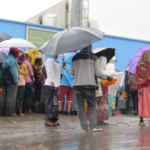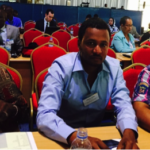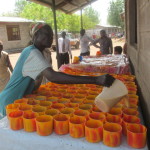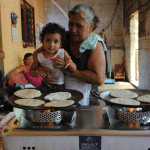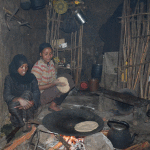Over recent weeks, long queues at fuel stations in Addis Ababa have been common occurrences. There’s a sense of desperation amongst the the people queuing; the queues move slowly in spite of the weather, which at this time of the … Continued
With over 1.2 billion people, India is the world’s second most populous country. According to the Global Alliance for Clean Cookstoves, about 67% of households out of this massive population rely on solid biomass fuels for preparing their food. That means … Continued
Household energy in Kenya is fraught with challenges – from indoor air pollution from the dependence on biomass such as charcoal and firewood to the potential dangers faced in gathering solid fuel. Women are the most vulnerable because they disproportionately … Continued
Gaia Association Director Desalegn Getaneh and Wubshet Tadele, Project Gaia’s Energy and Carbon Finance Consultant, recently attended the African Carbon Forum in Kigali. The Forum, hosted by the Rwandan government and organized by partners including UN agencies, the African Development … Continued
Project Gaia, Inc. (PGI) signed an agreement with Shell’s Nigerian production division, Shell Nigeria Exploration and Production Company (SNEPCo), on November 5 in Lagos. Both executive director Harry Stokes and Joe Obueh of PGI’s Nigerian affiliate, Project Gaia Prospects Ltd, … Continued
On October 8th, Project Gaia and its partners, Gaia Association, the Former Women’s Fuelwood Association (FWFCA) Stockholm Environment Institute (SEI), and the Nordic Environment Finance Corporation (NEFCO) inaugurated the first ethanol micro distillery of its kind in Addis Ababa, Ethiopia. … Continued
Carbon Africa, on behalf of Gaia Association and Project Gaia, Inc., an NGO based in the United States of America and which focuses on the distribution of efficient Cookstoves powered by ethanol from renewable sources. Project Gaia, Inc. is developing … Continued
Tanzania is a Sub-Saharan country with a population of close to 50 million people and an estimated growth rate of 2.8% in 2014. Of the total energy consumption in Tanzania, 88 percent is estimated to originate from fuel wood, 7 … Continued
Collaboration with Government of Ethiopia, United Nations High Commissioner for Refugees (UNHCR) and Horn of Africa Regional Environment Centre and Network (HoA-REC&N) will place Stoves in Refugee Camps and Urban Settings Monday, May 18, 2015 For Immediate Release: United Nations … Continued
Panel on creating a sustainable mass market for clean cooking fuels to be held May 19th in NYC. In partnership with the Global Alliance for Clean Cookstoves (GACC), the UN Sustainable Bioenergy High Impact Opportunities (HIO) Initiative, and the Stockholm Environment Institute (SEI), Project … Continued
New report reveals ethanol’s potential in Ethiopia, highlights barriers to widespread adoption as a cooking fuel, and recommends policy and regulatory changes to support ethanol as an alternative fuel Project Gaia and its sister organization, Gaia Association, have been working … Continued
Caveat Emptor “Ethanol?” The Home Depot sales clerk asked in disbelief. “Are you sure you don’t want propane? We don’t carry dangerous products like ethanol here.” With a glance at the power saw display, I thanked him for his recommendation … Continued
The government-owned sugar estates in Ethiopia were traditionally in the south, an optimal region for the farming of sugar cane. For years, the sugar industry struggled to find a solution for the molasses produced as a waste product in sugar … Continued
“Ethanol is the fuel of the future.” – Henry Ford On October 1, 1908, Henry Ford released a car that was made for the masses: the Model T. Thanks to the savings provided by assembly line production, the Model T … Continued
Energy poverty stands as one of the primary development issues of our time. Its consequences extend far and wide; those who do not have access to clean energy feel its absence in nearly every facet of their lives. “Energy is … Continued
